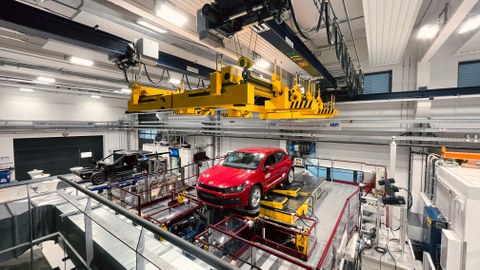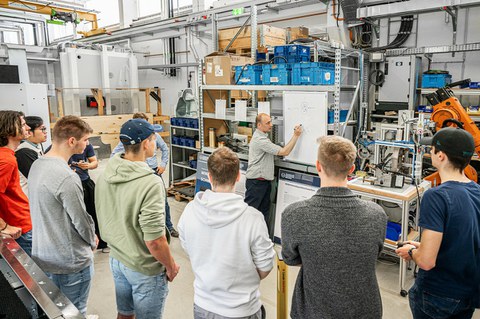Automotive engineering
Studying the second subject area "Automotive Engineering" in combination with the first subject area Metal and Mechanical Engineering qualifies students to complete their teacher training at a vocational school (vocational school, vocational college, technical college, vocational grammar school, etc.) in the vocational field[1] "Automotive Engineering" after the first state examination and then to be able to teach in the assigned professions as a teacher in the vocational field after graduation.
Table of contents
- Berufskraftfahrer:in
- Eisenbahner:in
- im Betriebsdienst - Lokführer:in und Transport
- in der Zugverkehrssteuerung
- Fahrradmonteur:in
- Karosserie- und Fahrzeugbaumechaniker:in
- Kraftfahrzeugmechatroniker:in
- Land- und Baumaschinenmechatroniker:in
- Leichtflugzeugbauer:in
- Maschinen- und Anlagenführer:in
- Metallbauer:in – Nutzfahrzeugbau
- Zweiradmechatroniker:in
fett = „Kernberufe“; normal = weitere oft zugeordnete Berufe
Subject combinations
The Department can only be studied as a second subject area in combination with the first subject area of Metal and Mechanical Engineering.
Study program
Various corresponding engineering sciences form the basis for the university education in the vocational department. First and foremost is automotive engineering with its specializations in automotive and rail vehicle engineering. However, the fields of mechanical engineering (e.g. mechanics, fluid mechanics), electrical engineering (fundamentals of electrical engineering) and computer science also play an important role. Other subjects in the specialist sciences include, for example, content from the fields of diagnostics and acoustics and, depending on the specialization, traffic safety in networked, automated driving or supporting structures or chassis in rail vehicle technology.
The Department continues to address important aspects of the professional field in research and teaching. For example, it also deals with the future and further development of vehicle technology through to changing mobility concepts, the necessary infrastructure (e.g. for electromobility), the work organization and process-related problems and challenges raised in the professions and workshops or companies (nationally and internationally).
Vocational didactics as a core element of teacher training should enable students to learn to analyze the competencies that come into play in the processes, to plan the competence development of the learners and to systematically prepare the diverse (teaching) content, to design, implement and reflect on the lessons in a way that is appropriate for the target group.
(cf. Pahl, J.-P./Herkner, V. (eds.) (2010): Handbuch berufliche Fachrichtungen. Bielefeld. 416-446.)
Current courses of the Chair of Metals and Machine Technology / Vocational Didactics for the Department of Automotive Engineering.
LEMMA - Teaching-related community platform for students and teachers of the Departments ETIT, FZT and MMT as well as OptLA students.
Have we piqued your interest?
Further information can be found under the following links
- Teacher training in general,
- Teacher Training - Vocational Schools and
- Study options for the technical teaching degree at vocational schools.
M.Sc. Alison Klein
<a target="_blank" class="ms-href external-link" data-a0="https://s" data-a1="ecuremail" data-a2=".tu-dresd" data-a3="en.de/web" data-a4=".app?" data-b0="rcpt=YWxp" data-b1="c29uLmtsZ" data-b2="WluQHR1LW" data-b3="RyZXNkZW4" data-b4="uZGU=">Send encrypted email</a> <span>via the SecureMail portal (for TUD external users only).</span>
Wissenschaftlicher Mitarbeiter
Professur für Metall- und Maschinentechnik/Berufliche Didaktik
Professur für Metall- und Maschinentechnik/Berufliche Didaktik
Visiting address:
Münchner Straße 1, Room MS1 578
01187 Dresden
- work Tel.
- +49 351 463-34573
Studienfachberater Höheres Lehramt an berufsbildenden Schulen BFR ET, MMT und FZT
Visiting address:
Münchner Straße 1, Room MS1 578
01187 Dresden
- work Tel.
- +49 351 463-34573


